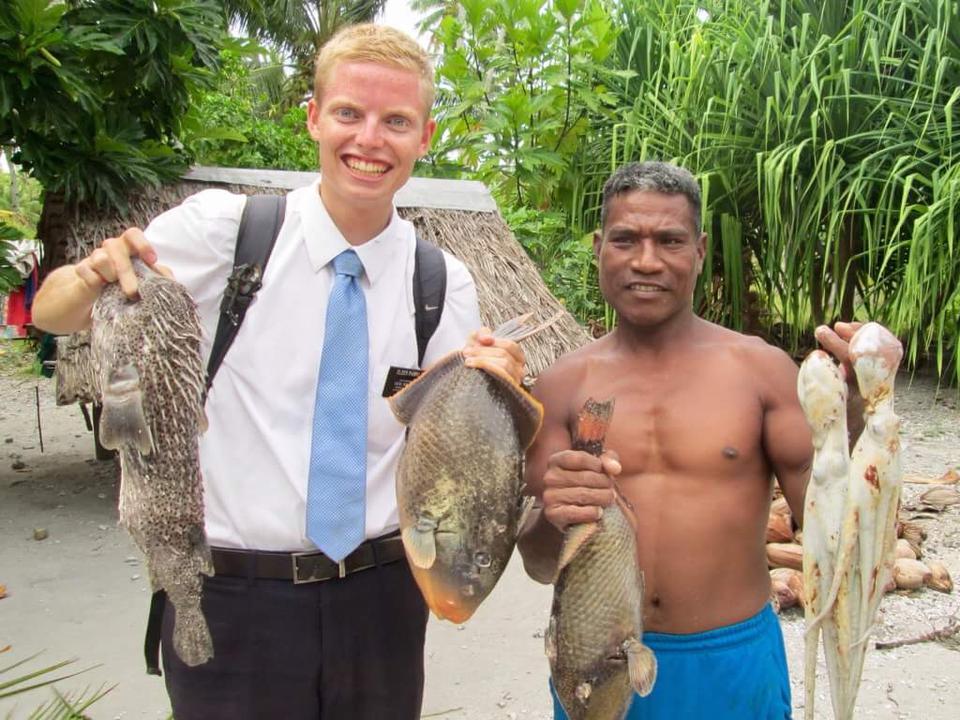Erik Parry’s first night in Kiribati as a missionary for The Church of Jesus Christ of Latter-day Saints was a long one. Mosquito-bitten and sweltering, he lay awake on a straw mat in a hut by the lagoon and looked over at his companion, who was sleeping soundly.
“How am I ever going to do this for two years?” Parry thought.
Little did he know that by the end of his two-year service he’d be writing a heartfelt poem about the joys of being a missionary in the islands.
That poem was put to a video by Parry’s former mission companion Danien Berends, and the video now has 8,000 views on YouTube and is circulating across Facebook.
Parry, from Idaho, and Berends, from Brisbane, were like many missionaries who serve for The Church of Jesus Christ of Latter-day Saints. Both were born and raised in the Church, and they decided to serve as missionaries in order to share happiness with other people.
“I just felt like Heavenly Father had blessed me with so much, and I’d seen how happy the gospel made me—how happy following Christ made me and my family,” Parry said. “I just wanted to give that back to people and share that with people, and serve them.”
Missionaries do not choose where they will be assigned, and they fund their entire 18 month to two year-experience themselves.
Berends said his parents supported his decision to serve a mission, but when he was called to Kiribati they worried about his health and physical wellbeing.
Conditions on the islands where both missionaries served were often basic. On some islands, there was no running water, so the missionaries would bathe in a well. They slept on mats and lived in huts, and in a few areas there were no computers, so they were unable to communicate with their families with anything but paper letters. Both Parry and Berends battled sickness and indigestion.
Though his family worried for him, Parry said the islands quickly felt like home.
“They could see the physical things that were hard, but they didn’t realize how spiritually wonderful it was,” Parry said.

As missionaries, Parry and Berends strove to help individuals and communities in Kiribati by giving service and teaching the gospel of Jesus Christ. Parry said they dug wells, built houses, cleaned wells, chopped coconuts and shaved down palm fronds with machetes to create house-building materials.
Berends said he received fulfilment by trying to set an example of kindness and by sharing his beliefs with the people of Kiribati.
“We were able to bring the purest teachings of Christ to them, and that was really rewarding,” Berends said. “I always tried to avoid any sort of confrontation. I really just wanted to share what we knew to be true and what we knew would bless their lives.”
Above all, Berends said he developed a wonderful connection with the people of Kiribati and grew to love them deeply.
A few months before his mission ended, Parry said he was thinking through the experiences he’d had and how he’d initially thought it was so difficult. He realized how wonderful his mission had really been, and how he wouldn’t have wanted to serve anywhere else. He wrote his poem, “Island Missionaries,” to capture his feelings about his experience in Kiribati.
Berends was inspired by the poem and decided to make a video about it using footage he captured on his point-and-shoot camera during his mission. He made the video as soon as his mission ended.
Both agreed that they deeply appreciated their time in the Pacific, and that their experiences with people in Kiribati had changed them for the better.
“We come and we act like we’re teaching them and trying to share things, but there’s so much they really teach you,” Parry said. “From the outside looking in, you can think that they don’t have much—I mean, they sleep in a hut, they don’t have very many worldly possessions, but they really have more than us. They believe so firmly in Christ, and they love each other, and it’s not something that’s even hard for them.”